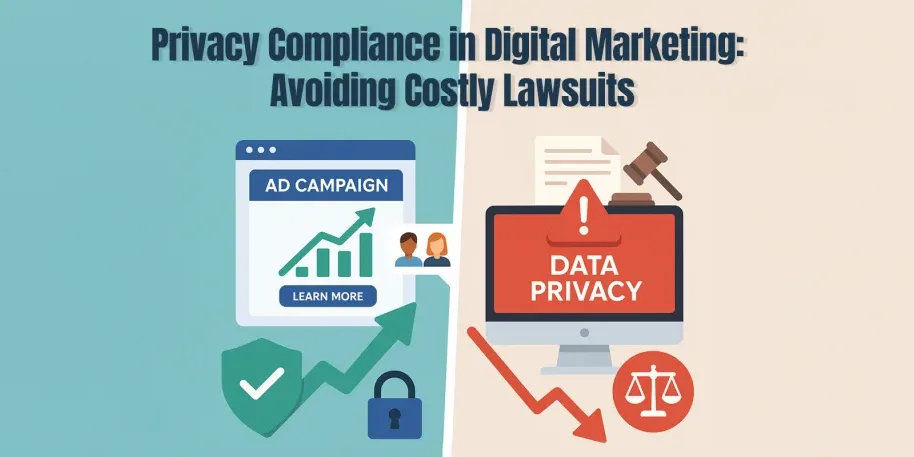

Privacy Compliance in Digital Marketing: Avoiding Costly Lawsuits
Posted March 18, 2025 by Kevin Chern
“Privacy is not an option, and it shouldn’t be the price we accept for just getting on the Internet.” — Gary Kovacs
For business owners navigating the digital marketing landscape, privacy compliance isn’t just another legal checkbox it’s a minefield. Mishandling consumer data isn’t just about losing customer trust; it can lead to devastating lawsuits, hefty fines, and brand reputational damage that takes years to recover from. With privacy laws tightening globally and consumers becoming more vigilant about their personal information, businesses must get proactive about compliance.
The Cost of Non-Compliance: Real-World Consequences
Let’s talk numbers. In 2023, Amazon faced a staggering $877 million fine under the General Data Protection Regulation (GDPR) for alleged violations (CNBC). Facebook, now Meta, has been fined over $5 billion for repeated privacy missteps (The Verge). These aren’t isolated cases—businesses of all sizes are in the crosshairs of regulators.
A single data privacy lawsuit can cost businesses an average of $3.86 million (IBM). Add in the reputational damage and lost customer trust, and the long-term impact can be immeasurable. If you’re running digital marketing campaigns, collecting user data, or retargeting customers, failing to comply with privacy laws could put your entire business at risk.
Understanding the Privacy Laws That Impact Your Business
Privacy compliance isn’t just about GDPR anymore. A growing patchwork of data protection laws makes it increasingly complex for businesses to remain compliant. Here are some of the key regulations you should be familiar with:
- GDPR (General Data Protection Regulation) — Applies to businesses handling the personal data of EU citizens, regardless of where the business is based. It mandates strict rules on data collection, storage, and user consent.
- CCPA/CPRA (California Consumer Privacy Act/California Privacy Rights Act) — Gives California residents rights over their data, including the ability to opt out of data collection and request deletion.
- HIPAA (Health Insurance Portability and Accountability Act) — Relevant for businesses handling health-related data, including medical marketing firms.
- PIPEDA (Personal Information Protection and Electronic Documents Act, Canada) — Sets rules for data collection, consent, and transparency for businesses operating in Canada.
- U.S. State Privacy Laws (Virginia, Colorado, Connecticut, Utah, and more) — A growing number of U.S. states are implementing privacy laws mirroring aspects of GDPR and CCPA.
How Privacy Compliance Affects Your Digital Marketing Strategy
1. Transparency and Consent Matter More Than Ever
Gone are the days when businesses could collect user data with vague privacy policies. Under GDPR and CCPA, you must obtain clear, informed consent before collecting personal data. This means:
- Using explicit opt-ins instead of pre-checked boxes.
- Offering easy-to-understand privacy notices with clear explanations of how user data will be used.
- Allowing users to withdraw consent at any time.
Pro Tip: Use a Consent Management Platform (CMP) to automate and track user consents efficiently.
2. Retargeting and Cookie-Based Marketing Are Under Fire
Third-party cookies have long been a staple in digital marketing, but Google plans to phase out third-party cookies by 2024 (Google). Privacy laws are making it increasingly difficult for businesses to track users across the web. Instead, marketers need to shift towards:
- First-party data strategies — Collecting data directly from users through subscriptions, loyalty programs, and gated content.
- Contextual advertising — Targeting users based on website content rather than personal browsing history.
- Server-side tracking — A more privacy-compliant way to collect analytics data without intrusive tracking.
3. Email Marketing: Staying on the Right Side of Privacy Laws
Email marketing is still one of the most powerful digital marketing channels, but it’s also an area rife with compliance risks. What you need to do:
- Obtain explicit consent before sending marketing emails.
- Include an easy opt-out option in every email.
- Maintain clear records of consent in case of audits.
Violating email privacy laws can be costly—the CAN-SPAM Act allows fines of up to $46,517 per violation (FTC).
4. Data Minimization: Collect Only What You Need
Businesses often fall into the trap of hoarding user data under the assumption that it might be useful later. Privacy laws emphasize data minimization, meaning you should only collect and store the information absolutely necessary for your marketing efforts.
- If you don’t need a user’s birthdate, don’t ask for it.
- Limit access to sensitive data within your organization.
- Regularly audit your data collection processes to ensure compliance.
Implementing a Privacy-First Marketing Strategy
To avoid lawsuits and build trust with consumers, businesses should take a proactive approach to privacy compliance. Here’s how:
1. Conduct a Privacy Audit
Review your current digital marketing practices to identify potential compliance gaps:
- What data are you collecting?
- How is it being stored?
- Are you following proper consent procedures?
2. Update Privacy Policies
Your privacy policy shouldn’t be buried in legal jargon. Ensure that it:
- Clearly explains what data you collect and why.
- Specifies how users can control their data.
- Is easily accessible on your website.
3. Train Your Marketing Team
Privacy compliance isn’t just an IT issue—your marketing team needs to understand the laws as well. Conduct regular training sessions to keep them updated on:
- Data collection best practices.
- Legal requirements for advertising and email marketing.
- Emerging trends in privacy compliance.
4. Use Privacy-Enhancing Technologies (PETs)
Investing in technologies that protect user privacy can save you from legal headaches:
- End-to-end encryption to protect customer data.
- Zero-trust security frameworks to limit data access.
- AI-driven compliance tools that detect potential violations before they become a problem.
5. Monitor Legal Changes
Privacy laws are constantly evolving. Subscribe to regulatory updates from organizations like the International Association of Privacy Professionals (IAPP) or hire a privacy consultant to stay ahead of legal risks.
The Bottom Line
Privacy compliance isn’t just about avoiding lawsuits—it’s about building a sustainable, trustworthy brand in an era where consumers demand transparency. With data protection regulations only getting stricter, businesses that adapt to privacy-first marketing now will be the ones standing tall in the years to come.
Are you confident your digital marketing strategy meets 2025’s privacy standards?
If you’re unsure whether your campaigns are truly compliant, our privacy experts at Sanguine can help you audit and adapt.
Schedule a privacy check consultation today

Kevin Chern – CEO – Sanguine Strategic Advisors
After 30 years of building businesses while navigating some of the most complex paths to success, Kevin Chern founded Sanguine Strategic Advisors to lend his insight and experience to other serial entrepreneurs, small business owners and folks in need of a roll-up-your-sleeves innovator, deal maker and doer.
Tags:




